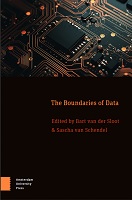The Boundaries of Data
Contributor(s)
van der sloot, bart (editor)
van Schendel, Sascha (editor)
Collection
Dutch Research Council (NWO)Language
EnglishAbstract
The legal domain distinguishes between different types of data and attaches a different level of protection to each of them. Thus, non-personal data are left largely unregulated, while privacy and data protection rules apply to personal data or personal information. There are stricter rules for processing sensitive personal data than for ‘ordinary’ personal data, and metadata or communications data are regulated differently than content communications data. Technological developments challenge these legal categorisations on at least three fronts: First, the lines between the categories are becoming harder to draw and more fluid. Second, working with various categories of data works well when the category a datum or dataset falls into is relatively stable. However, this is less and less so. Third, scholars increasingly question the rationale behind the various legal categorisations. This book assesses to what extent either of these strategies is feasible and to what extent alternative approaches could be developed by combining insights from three fields: technology, practice and law.
Keywords
Personal data, anonymous data, pseudonymous data, metadata, sensitive personal dataDOI
10.5117/9789463729192ISBN
9789463729192, 9789048557998Publisher
Amsterdam University PressPublisher website
https://www.aup.nl/Publication date and place
Amsterdam, 2024Grantor
Classification
Constitutional and administrative law: general
Privacy law
Ethical issues and debates


 Download
Download